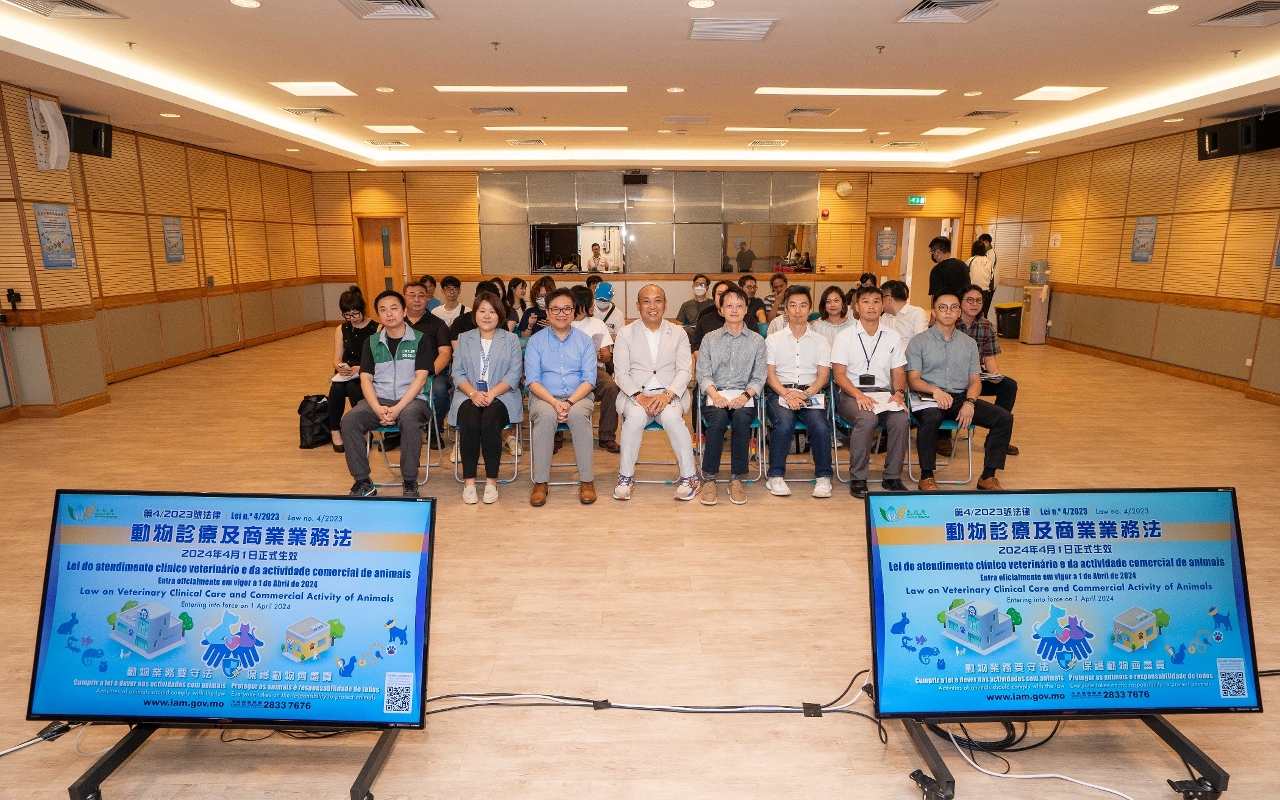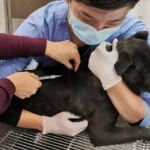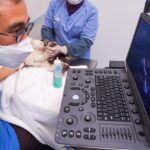 IAM continues to promote points to note for transition period of “Law on Veterinary Clinical Care and Commercial Activity of Animals”
IAM continues to promote points to note for transition period of “Law on Veterinary Clinical Care and Commercial Activity of Animals”
The Municipal Affairs Bureau (IAM) continues to explain the points to note for transition period of the “Law on Veterinary Clinical Care and Commercial Activity of Animals” to members of the sector. The transition period for relevant certification of professional accreditation of individuals who had engaged in the veterinary profession in Macao before the law came into effect will end this month, after which they will be required to submit registration applications to IAM in accordance with the law before they can continue to exercise the profession. Meanwhile, through talks organised with other departments on licenses for establishments of veterinary clinical care activities and establishments of commercial activity of animals and with the aim of promoting the sound development of the sector and ensuring an orderly transition to the new law, IAM has explained the requirements for installation of establishments, licensing process and the regime of temporary license during the transition period to members of the construction sector to deepen their understanding of the standards of the new law and to assist persons in charge of the establishments in carrying out relevant construction projects when needed.
Transition period for certification of veterinary professional accreditation to end and practitioners are required to register
Law No. 4/2023 “Law on Veterinary Clinical Care and Commercial Activity of Animals” came into effect on 1 April this year, and the transition period for certification of veterinary professional accreditation ends on 28 June this year. Until 25 June 2024, the Council of Veterinary Medicine Professionals (CPMV) has received a total of 117 applications for certification of veterinary professional accreditation, of which 57 qualified applications have been approved and issued with the “veterinary professional accreditation certificate”. CPMV will process the remaining applications in chronological order.
Macao residents and non-resident employees who were engaged in veterinary clinical care in Macao before the law came into effect and have successfully completed the certification of veterinary professional accreditation are required to apply to IAM for registration in accordance with the law within 180 days from the date of entry into force of the law. They may continue to exercise the veterinary profession before the registration process is completed. After the above-mentioned transition period (i.e., after 27 September this year), all veterinary surgeons must be registered in accordance with the provisions of the law before they can be engaged in veterinary clinical care and other activities that must be performed by veterinarians in accordance with the law. Otherwise, they will be deemed to be exercising the profession without license.
Applicants need to go to the Health Bureau for a physical examination and apply for the Certificate of Criminal Record at the Identification Services Bureau. Relevant applications can be made by appointment on Macao One Account. After completing the relevant preparations, applicants can submit the completed application form for registration of veterinary surgeons, a copy of a valid identification document, a copy of the veterinary professional accreditation certificate, the health certificate issued by a doctor from the Health Bureau, and the Certificate of Criminal Record at any of the Public Services Centres of IAM. Those who are considered to meet the statutory requirements for registration after review and analysis will be issued with the “registration card of veterinary surgeons” that is valid for two years.
Talks to help members of construction sector understand standards for installation of establishments
In addition to regulating the practice of veterinary medicine, the above-mentioned law also stipulates the regime of licensing and supervision of establishments of veterinary clinical care activities and establishments of commercial activity of animals in Macao. The Secretary for Administration and Justice Writ of Instruction No. 5/2024 “Definition of Requirements regarding the Compartments, Facilities and Equipment of Establishments of Veterinary Clinical Care Activities and Establishments of Commercial Activity of Animals” was also issued to standardise the prerequisites for the installation of establishments of veterinary clinical care activities and establishments of commercial activity of animals (including breeding, sale or boarding of animals). The new law also includes a regime of temporary license applicable to existing establishments that meet the transitional requirements to help members of the sector adapt to the stipulations of the new law.
Recently, IAM, the Land and Urban Construction Bureau, the Fire Services Bureau, and The Macau Institute of Engineers jointly organised talks to explain the regime of licensing for the above-mentioned establishments and the points to note to the members of the construction sector, so as to assist persons in charge of the establishments in carrying out relevant construction projects when needed, promote the sound development of the sector and ensure an orderly transition to the new law. If interested individuals would like to find out more about the relevant administrative formalities, they can visit the column of “Law on Veterinary Clinical Care and Commercial Activity of Animals” on IAM’s Macau Animal Health Control Website at www.iam.gov.mo/canil.





